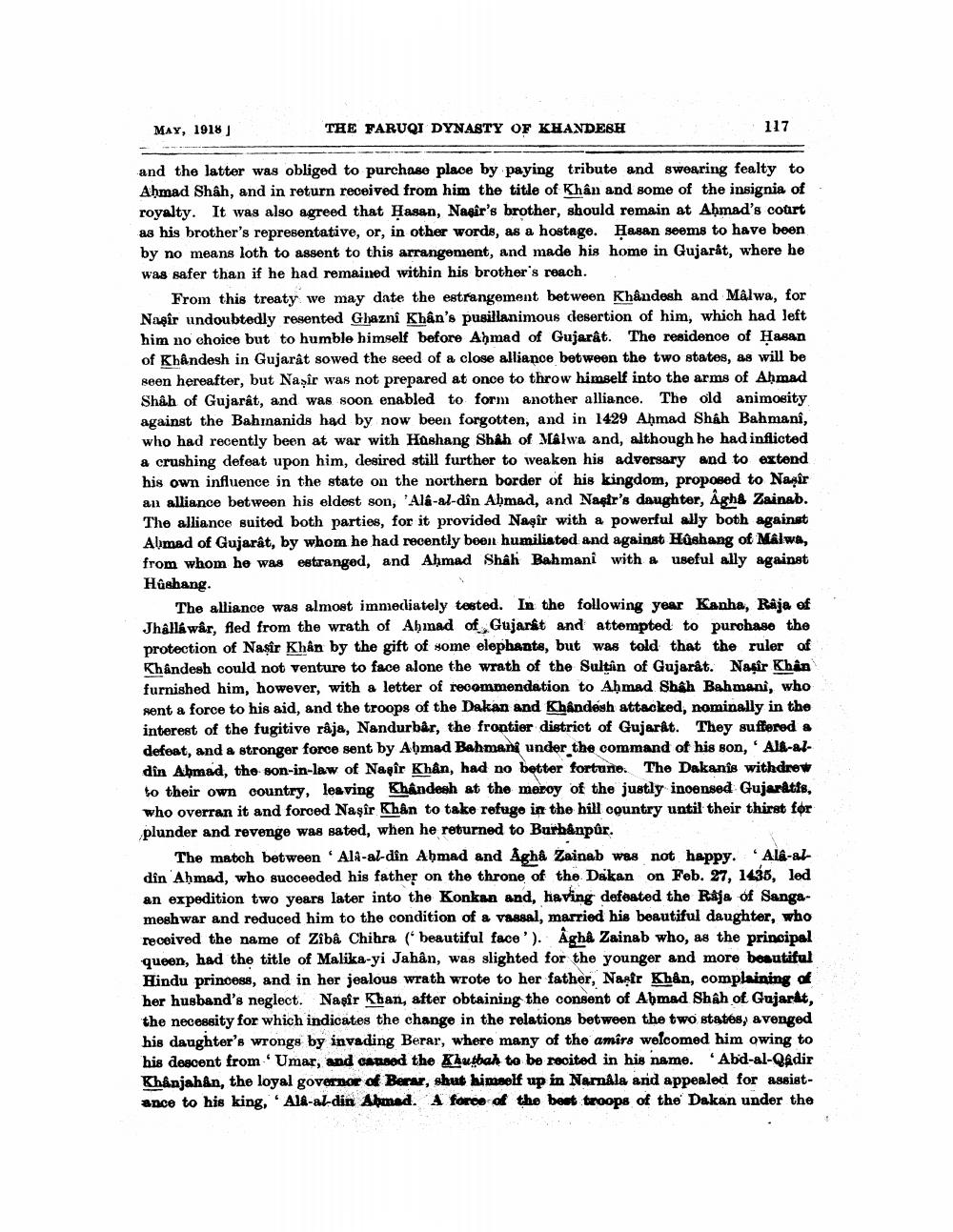________________
MAY, 1918
THE FARUQI DYNASTY OF KHANDEBH
117
and the latter was obliged to purchase place by paying tribute and swearing fealty to Ahmad Shah, and in return received from him the title of Khan and some of the insignia of royalty. It was also agreed that Hasan, Nagar's brother, should remain at Ahmad's court as his brother's representative, or, in other words, as a hostage. Hasan seems to have been by no means loth to assent to this arrangement, and made his home in Gujarat, where he was safer than if he had remained within his brother's reach.
From this treaty we may date the estrangement between Khandesh and Malwa, for Nasir undoubtedly resented Ghazni Khân's pusillanimous desertion of him, which had left him no choice but to humble himself before Ahmad of Gujarat. The residence of Hasan of Khandesh in Gujarât sowed the seed of a close alliance between the two states, as will be seen hereafter, but Naşir was not prepared at once to throw himself into the arms of Ahmad Shâh of Gujarât, and was soon enabled to form another alliance. The old animosity against the Bahmanids had by now been forgotten, and in 1429 Ahmad Shah Bahmani, who had recently been at war with Hushang Shah of Malwa and, although he had inflicted a crushing defeat upon him, desired still further to weaken his adversary and to extend his own influence in the state on the northern border of his kingdom, proposed to Nasir an alliance between his eldest son, 'Ala-al-din Ahmad, and Nagir's daughter, Agha Zainab. The alliance suited both parties, for it provided Naşir with a powerful ally both against Almad of Gujarat, by whom he had recently been humiliated and against Hüshang of Malwa, from whom he was estranged, and Ahmad Shah Bahmani with a useful ally against
Hûshang.
The alliance was almost immediately tested. In the following year Kanha, Raja of Jhallå wår, fled from the wrath of Ahmad of Gujarat and attempted to purohase the protection of Naşîr Khân by the gift of some elephants, but was told that the ruler of Khandesh could not venture to face alone the wrath of the Sultan of Gujarat. Nazir Khan furnished him, however, with a letter of recommendation to Ahmad Shah Bahmani, who sent a force to his aid, and the troops of the Dakan and Khandesh attacked, nominally in the interest of the fugitive råja, Nandurbâr, the frontier district of Gujarat. They suffered a defeat, and a stronger foroo sent by Ahmad Bahmani under the command of his son, 'All-aldin Abmad, the son-in-law of Napir Khân, had no better fortune. The Dakanis withdrew to their own country, leaving Khandesh at the meroy of the justly inoensed Gujaratis, who overran it and forced Naşir Khan to take refugo in the hill oquntry until their thirst for plunder and revenge was sated, when he returned to Burhanpur.
The match between Ald-al-din Ahmad and Agha Zainab was not happy. Ald-ab dîn Ahmad, who succeeded his father on the throne of the Dakan on Feb. 27, 1435, led an expedition two years later into the Konkan and, having defeated the Raja of Sangameshwar and reduced him to the condition of a vassal, married his beautiful daughter, who received the name of Ziba Chibra ( beautiful face'). Agha Zainab who, as the principal queen, had the title of Malika-yi Jahân, was slighted for the younger and more beautiful Hindu prinoons, and in her jealous wrath wrote to her father, Nagtr Khan, oomplaining of her husband's neglect. Naşir Khan, after obtaining the consent of Abmad Shah of Gujarat, the necessity for which indicates the change in the relations between the two states, avenged his daughter's wrongs by invading Berar, where many of the amire welcomed him owing to his descent from Umar, and caneed the Khutbah to be recited in his name. 'Abd-al-Qadir Khánjahân, the loyal governor of Berar, shut himself up in NarnAla and appealed for assistance to his king, 'Ala-al-din Ahmed. A force of the best troops of the Dakan under the




